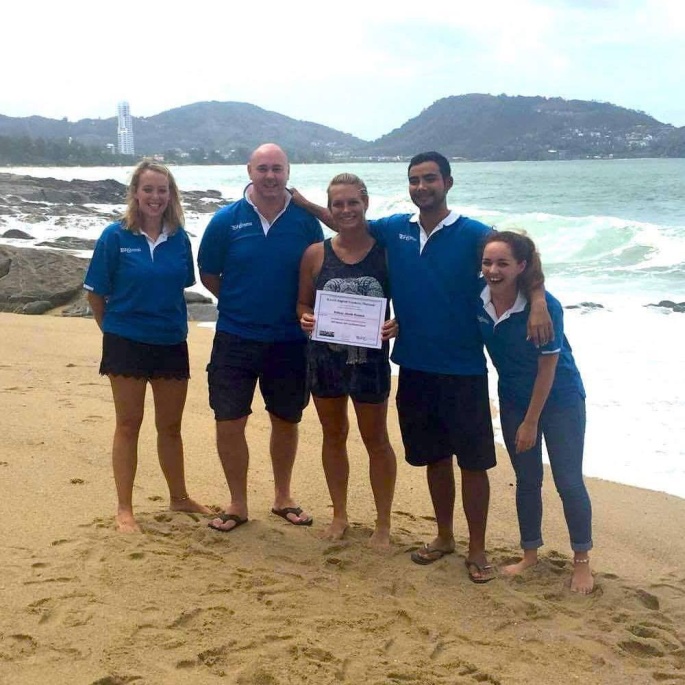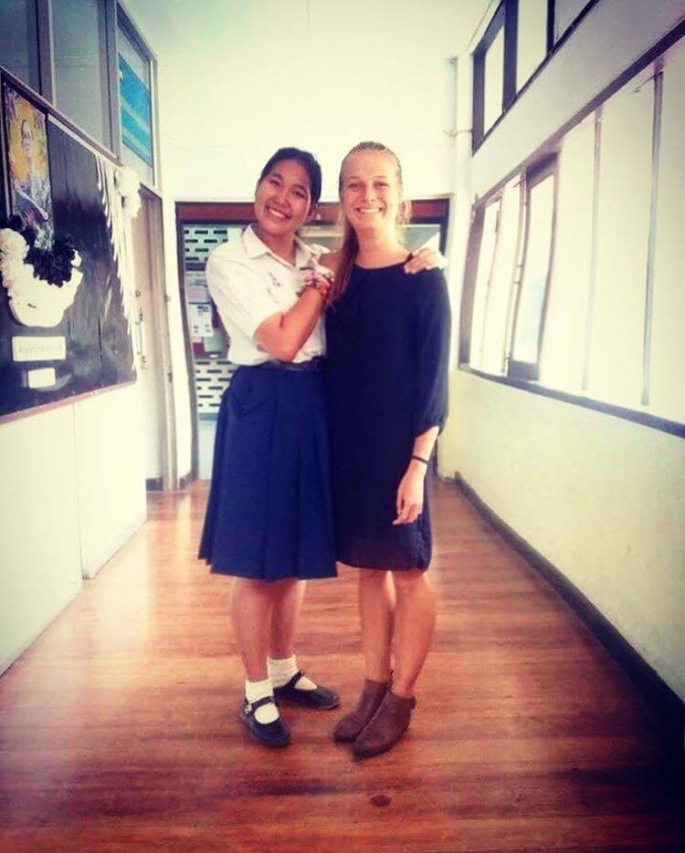I began my journey in Thailand with a three week TEFL course in southern Phuket (more on that later) where I began to learn the basics about teaching abroad. As you can imagine, having minimal teaching experience and having never been to Thailand before, I had an endless slew of questions. Luckily, I had two of the best trainers (shout out to Amy and Aileen) who, despite being incredibly accommodating, drove me absolutely crazy with their favorite response to any question I posed: “it depends.” Although incredibly frustrating at the time, it didn’t take me long to realize that they were right. Everything regarding teaching in Thailand depends on your specific situation. Whether the topic is type of school (government vs. private), salary, dress code, hours, supplies, or basic organization, everything depends on your specific school. I have found that no two schools are alike, but having worked at two myself, I have gained some insight on the varying factors and I am here to share what it has been like for me to teach abroad in Thailand (but remember, ‘it depends’ and everyone’s experience will be different).
The TEFL Course:
There are hundreds of different programs out there that offer TEFL courses (Teaching English as a Foreign Language), but with the help of some friends and a few Google searches, I chose a company called TEFL Heaven. This particular company offered the course in person (as opposed to online) in a ‘paradise’ location in Thailand. So, off I went to Phuket where I spent an amazing three weeks learning all about how to teach English abroad, while making lifelong friends and some crazy memories. By the end of the course, I had received my TEFL certificate and was ready to teach abroad! (In Thailand, as long as you have a degree, [and in some instances not having a degree isn’t detrimental to being hired], and your TEFL certificate, you’re all set to begin your career of teaching abroad).

Agency Vs. On Your Own:
There are a number of pros and cons regarding both agencies and going at it on your own. Let’s begin with agencies. The main point of an agency is to help you secure a job and to situate any necessary documents…and to take half of your paycheck (but I’ll get back to that when I discuss the cons).
If you decide to go through an agency (which I originally did) one of the biggest pros is that you are guaranteed a job. I knew before I even left the States, that at the completion of my TEFL course, I would have a job provided to me, which obviously helped to keep the ‘I’m starting a life on the other side of the world’ stress at a minimum.
Another major benefit of going through an agency (with whom you can connect with online before leaving or in person once you arrive) is the fact that you have someone to talk to and ask questions. Whether I had questions about my school specifically, my proper documentations, or Thai culture, I was able to go to my agency and ask for an answer (which is especially nice when you move to a new country where most people don’t speak English).
Okay, on to the cons. The biggest and most important con is that agencies take a HUGE amount from your monthly salary. Specifically, my agency took about 20,000THB a month out of my paycheck (roughly $604USD). This (I assume) is the fee I incur for having a company set me up with a job and proper documentation. Another con: agencies typically do a very poor job of actually organizing documentation and fulfilling their tasks.
With this being said, I am glad that I went with an agency to start my trip abroad; if not solely because I knew I had a job once I arrived in Thailand. Another added benefit, I began my trip surrounded by other like-minded individuals who were also uprooting their lives to live abroad so, I immediately had a group of friends and having good friends in a foreign environment made a tremendous, positive impact on my experience. After I established a life in Thailand and felt comfortable on my own, I quickly ditched my agency and looked for a job independently.
Okay, so going at it on your own. This can definitely be overwhelming but the good news is that it is extremely easy to find a job teaching English in Thailand if English is your first language. There are tons of resources online such as Facebook groups where people post ads for teachers almost every day (and then there’s always good old Google). The major con about trying to find a job without an agency is the uncertainty of it all. The major pro is that you will get paid A LOT more money because you avoid the middle man.
For me, I didn’t know how easy (or how difficult) it would be to establish a life in Thailand. Having some sort of plan in place really helped to make my trip a reality (and this is coming from someone who typically thrives off of spontaneity).
If I were to recommend an option to someone I would honestly say to go ahead with the agency for the first six months of your journey abroad. Use the stability of knowing you have a job to focus on other important things like where to live, how to get around, and how to communicate. Once you feel comfortable on your own (and realize how easy it is to go at it on your own) leave the agency and get the pay raise you deserve!
Government vs. Private Schools
With an agency, you don’t get much say in where you’re placed. For me, I was placed in a suburb of Bangkok called Min Buri. At first, I was a bit disappointed, having wanted to be placed centrally in the city but I quickly fell in love with Min Buri and the government school in which I was assigned.
The major difference between government and private schools is the funding. Luckily, the school I was placed at (Bodindecha Sing Singhaseni) was one of the nicer government schools but it still lacked air conditioning and any supplies needed to teach lessons (besides a potential white board maker, which may or may not have ink, I was left to produce all teaching material on my own).
Moreover, schools in Thailand, specifically government schools, are known for their lack of organization and communication. Due to unexpected assemblies or activities, and the fact that students in Thailand are not allowed to fail and will pass regardless of grades or attendance, I found that half the time the students wouldn’t even show up to class.
The school itself was incredibly nice for a government school. With basketball courts, a full track, swimming pool, and a mandatory entrance exam, Bodin is actually ranked among the top five government schools in Thailand. That being said, I thought I had it pretty good compared to some of my friends who were teaching in what seemed to be the slums of Thailand, where the schools seemed to be crumbling down around the lone squatty potty available to teachers. I realized you can gauge how nice your school is based on whether or not they provide proper toilets. Luckily for me, Bodin was fully equipped with proper plumbing.
Another major difference between government and private schools is the pay, which is why I ultimately decided to leave Bodin for my current, private school, Lertlah. It wasn’t until I started working at Lertlah that I realized the drastic differences between private and government schools.
For starters, Lertlah has an endless supply of supplies and what they don’t have can be ordered at your request. There are also a lot more expectations at a private school. The students’ parents are paying a lot of money to send their child to school so the teachers are responsible for things such as specific lesson plans, administrating and grading exams, and writing report cards (whereas at my government school, all that was expected of me was to show up to class).
My particular school is actually mandated by a Canadian curriculum so the expectations are closer to those back in the Western part of the world. The organization is much better, the students’ ability to speak English is much higher, and although there continues to be some lapses in communication, overall the school is structured much better than that of my past government school.
Personally, I think teaching at both a government and private school has been rewarding. I was able to see how the less fortunate children of Thailand experience a school day verse those that are wealthier. I think if you want a true experience of teaching abroad, you should start off at a government school. This is where the cultural and monetary differences are prominent and makes you truly appreciate all that you have.
Age and Class Set up
If you go through an agency, you’ll likely not have a say on the age group you’ll be teaching. Obviously, if you ditch the agency you can choose whichever age group suits you. For me, I was originally placed with Matthayom aged students (or high school). I taught primarily M2 (12-13yrs old) and M6 (17-18yrs old). At first I was a bit disappointed because I had my mind set on kindergarten, by after meeting my students I quickly fell in love.

Being at a government school, my M2 students’ ability to speak English was pretty much nonexistent. This meant I often found myself speaking to a room full of non-responsive young adults and struggling to properly convey my lesson. However, this also meant that the students and I worked together, helping each other learn each other’s language and communicate more fluently (not to mention tons of laughter at the fact that 90% of the time no one knew what was being said).
When I left Bodin for Lertlah, I chose to switch gears and start teaching kindergarten. Although very different, this age group is just as rewarding. In Thailand, children begin school at a much younger age than, say, the U.S. (18 months vs. 5 years) and I was placed in the K1 department (3yrs old) where they are just beginning to learn both Thai and English. Luckily, most of my students’ parents speak at least a little English at home so my kids speak surprisingly well (some, in fact, speak better than my high school students did).
Both age groups have their ups and downs. Kindergarten definitely takes more energy, needing to maintain a consistently high level of enthusiasm, but boy are those babies cute; whereas high school students (depending on their level of English) have to ability to actually hold a conversation and share their opinions during open discussions.

How The School is Run:
Every single school in Thailand differs on how it’s run. For example, at Bodin, I had 22 classes a week, consisting of anywhere between 25 and 50 students, and I saw each class once a week. This meant I only had one 50 minute class period a week to instill some basic English communication to my students; which also meant it was very difficult for my students to retain much, if any, of what I taught.
Whereas, at Lertlah, I have two separate classes of about 20 kids, each whom I see every day for roughly a two hour time period. I absolutely love this because the extra time has not only allowed me to build a bond with my students, but I have actually been able to witness my students’ development in regards to the English language.
Basically, class size and how the classes are administered all depends on the specific school. However, I can say with certainty that almost all of the government schools will have classes of roughly 50 students whereas private schools typically average no more than 25 students per class.
Dress Code:
When it comes to teaching in Thailand, wardrobes consist of black, black, and more black. Although some schools are more lenient on color scheme, most schools require you to wear black (or a dark color such as gray or navy blue) and to be conservative with your attire.
As far as women go, your bottoms must reach below the knee (the longer the better) and you must have sleeves (most schools accept short sleeves, as long as your shoulders are covered).
For men, a button down with a tie and dress pants is the norm. However, like I said it all depends. For example, my current private school actually requires a specific uniform in which all the teachers must wear. So, instead of the traditional black, we wear a soft yellow shirt with green bottoms (the school’s colors).
In general, Thailand is a very conservative country; whether you’re in the classroom or wandering around the city, you should always be dressed in a modest, respectful manner.
What the School Provides:
Most government schools will not provide you with anything besides the job itself. Private schools on the other hand, will often provide housing, health insurance (although limited), paid vacation time, and sometimes even transportation to and from school.
When it comes to added benefits, private schools are the way to go. However, that being said, I wasn’t provided anything ‘extra’ with my government school, and it really wasn’t a setback. Maybe because it was my first experience teaching abroad and I didn’t realize what was available to me in terms of added benefits but I was able to get along just fine without things such as provided accommodation and health insurance (luckily, I don’t get sick often, but if you do, there’s always traveler’s insurance you can purchase on your own).
In general, all schools will provide some sort of contract you must sign that outlines your duties and responsibilities, as well as what the school will provide for you. Just as with any other job, make sure to do your research beforehand and read your contract in its entirety.
Go With the Flow:
If you’re familiar with me at all, you know I’ve grown to live by the Thai phrase ‘mai pen rai‘ (the whole ‘don’t stress’ saying that’s famous in Thailand) which has proven to be my classroom motto. You should never expect for a school day to go exactly as planned. If you’re high anxiety you’ll need to reel it in because more often than not, your lesson and your school day will not go as expected. Whether there is an impromptu photo shoot, a school assembly no one told you about, the internet stops working, classes cancelled or students just don’t show up, obstacles will present themselves and you need to be able to laugh, adjust your lesson accordingly, and let it go.
Summing it Up:
Teaching abroad has been an unbelievably remarkable experience and I would recommend it to anyone looking to live abroad. I do want to stress, however; that although there is plenty of room for travel, teaching abroad is still a full time job that needs to be taken seriously. I am in charge of shaping and influencing young children and, just like they are helping me to achieve my dream, I am helping them to become well-rounded individuals who someday will have the opportunity to fulfill their own dreams.
I continue to be grateful that I’ve been able to achieve my goal of living abroad and I hope this article will prove insightful to both individuals looking to teach abroad themselves, and to friends and family who have been wondering about my teaching experience.
Until next time,
Xx Kels
